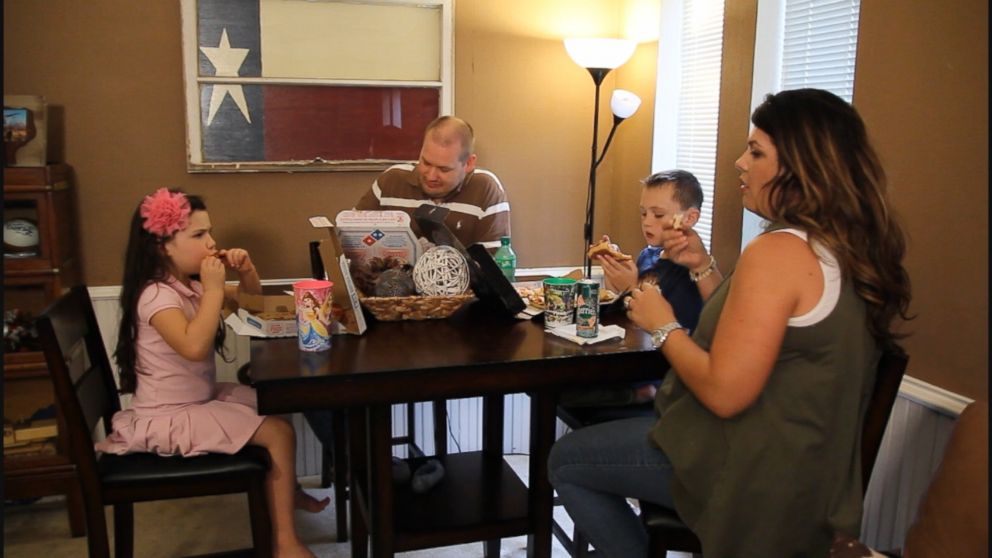Parents with 2 young kids obsessed with electronic devices get an intervention
Autumn, a mother of two, and her family went four weeks without using devices.
— -- Autumn, a mother of two from Texas, had just caught her 8-year-old son Jackson red-handed.
“What do you think you’re doing?” she asked him and his 5-year-old sister, Taylor.
“Sneaking,” the little boy responded.
“Sneaking what?” Autumn asked.
“The devices,” he said, giggling.

Autumn said her kids are desperate to play on their electronic devices every free moment. It’s gotten to the point where they often ignore her when she tries to put time limits on their use and go into full meltdown mode when she tries to take them away.“The first thing out of their mouths is, ‘Hey mom, I want to get on the device. What do I have to do? Do I have to read? Do I have to do this?’” Autumn said. “So just definitely frustrated.”
Watch the full story on ABC News’ “20/20” on Friday, May 19, at 10 p.m. ET.
Fed up, Autumn and her family agreed to have ABC News connect them with child psychiatrist Dr. Victoria Dunckley, author of the book “Reset Your Child’s Brain,” for a mini-intervention. Dunckley said she coined a name for kids’ obsession with devices: electronic screen syndrome, or when she says the nervous system is overstimulated with too much screen time.
“The child goes into a state of hyper-arousal, and the brain just starts to malfunction, so you see problems with focus, behavior and mood,” she said. “A lot of times with screen-time issues, people tend to blame the parents. They just say, ‘Oh, this is a parenting issue,’ and that’s not actually true. A lot of families will actually restrict screen time pretty well, but the kids can still have symptoms.” Some experts says other underlying issues might be fueling this behavior, but Dunkley believes removing screens is the only way to tell.
Autumn’s husband, Chad, acknowledged that their children’s constant electronics use seem to be negatively impacting both of them.
“Jackson … it's difficult for him to focus,” he said. “I would say, my daughter, she has more behavioral issues.”
Dunckley convinced the family to do a four-week electronic “fast,” meaning giving up their devices -- including a Chromebook, an iPad and a Nintendo gaming system -- for about a month. She suggested fun replacement activities instead so the kids had less time to focus on not having their devices.
“If we remove those screens for a sustained period, then the nervous system calms down,” Dunckley said. “The child gets better rest. They start functioning better. They’re sleeping better and then we can see: Do they really still have attention symptoms? Are they really still misbehaving as much?”
As the days go by, the kids started to try new things. They both joined a jujitsu class and began to spend more time outside, which Autumn said wasn’t “something they had done before.” The family also dusted off forgotten board games.
At the end of the four-week fast, Jackson declared that he has “more fun without the devices now” because “we spend more time outdoors.”
“I like to play with my sister even more than I did before,” he added.
Taylor chimed in, “We love each other.”
Autumn and Chad said they began spending more time together as a family as well. They took the kids to a festival and to watch horse racing. Over time, the parents said they noticed Jackson had started reading more and Taylor’s behavior had improved.
“She's trying to find some ways at least recognizing when she gets so frustrated,” Autumn said.
One of the lessons Dunckley said the parents will learn through this exercise is to take a close look at how often they use devices themselves, then realize how often they allow their kids to use them “in terms of using it as an electronic babysitter.”
“Their vulnerability is that they are a really plugged-in family, so it’s going to be a lot of lifestyle changes, really, for everybody in the family,” Dunckley said.
As for the family’s device use in the future, Chad and Autumn said they are trying to find a balance.
“I think we all have to be really careful that we realize that social media does not replace the social experience,” Autumn said.
Watch the full story on ABC News’ “20/20” on Friday, May 19, at 10 p.m. ET.




